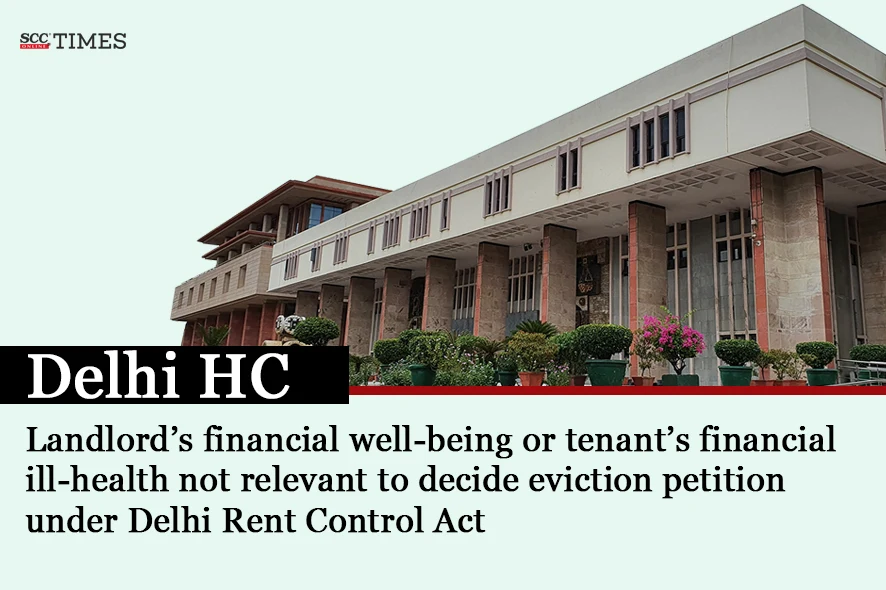Delhi High Court: While deciding revision petitions filed under Section 25B(8) of the Delhi Rent Control Act, 1958 (‘DRC Act’) read with Section 115 of the Civil Procedure Code, 1908, seeking to set aside the similar but separate judgments dated 25-07-2013, passed by the Additional Rent Controller, Dwarka Courts, New Delhi (‘ARC’), a Single Judge Bench of Anup Jairam Bhambhani, J.*, stated that financial well-being of a landlord, or the financial ill-health of a tenant, were not relevant considerations while deciding an eviction petition under section 14(1)(e) of the DRC Act. Thus, the Court allowed the eviction petitions and held that the petitioners were entitled to evict the respondents from the subject premises and obtain vacant, physical possession thereof, in accordance with law.
Background
The revision petitions in question were related to two premises adjoining each other, rented for Rs. 40/month and occupied by tenants for over 50 years without formal agreements. On 17-04-2009, the petitioners filed eviction petitions under Section 14(1)(e) of the Delhi Rent Control Act, 1958, claiming the premises were required by petitioner 2 for expanding his business in India.
The eviction proceedings culminated in passing of the impugned judgments dated 25-07-2013, which dismissed the eviction petitions on the ground that the petitioners had failed to prove that they had any bona-fide requirement for the subject premises. The ARC also stated that petitioner 1 (who is the mother of petitioners 2 and 3) cannot run a business due to her ill-health; and since petitioner 2 and 3 were settled-in and were running their businesses in London and Dubai respectively, they did not require the subject premises for their “subsistence or survival”. Therefore, their bona-fide requirement did not amount to being an “actual need”.
Counsel for the petitioners, submitted that that the ARC erred by rejecting the eviction petitions based on an incorrect legal understanding of “bona fide requirement.” It was emphasized that the tenants cannot dictate how landlords use their property. Further, even if the subject premises alone cannot be used to run a sit-down restaurant, it can be used to operate a food take-away business or delivery joint, which was essentially like running a restaurant.
Whereas, counsels for the respondent raised three key objections: (1) the petitioners were neither lawful owners nor landlords, as their claim was based on a contested settlement in a partition suit (2) the petitioners were NRIs, settled abroad since the 1970s, with no concrete plan to return to India; and (3) they admitted that the small size of the premises made it unfit for a restaurant, their pleaded need, and that they do not require it for “subsistence or survival.”
Case Analysis and Decision
The Court stated that whether the petitioners were able to run a full-fledged, sit-down restaurant or a smaller food take-away vend was entirely the petitioner’s prerogative and the bona-fides of their requirement could not be discounted based merely on the ARC’s assessment of whether a food business can be run from the subject premises. The Court stated that this view taken by the ARC was flawed when tested on the touchstone of the observations in Hindustan Petroleum Corpn. Ltd v. Dilbhar Singh, (2014) 9 SCC 78.
The Court noted that the ARC had observed that the petitioners were financially well and did not require the subject premises for their subsistence or survival, the requirement cited in the eviction petitions was not bona-fide but a mere desire, whim or fancy which could not be the basis for the respondents’ eviction. The Court relied on Raghunath G Panhale v. Chaganlal Sundarji, (1999) 8 SCC 1 and observed that the financial well-being of a landlord, or the financial ill-health of a tenant, were not relevant considerations while deciding an eviction petition under Section 14(1)(e) of the DRC Act and the view taken by the ARC was wholly uncalled-for and illegal.
Further, dealing with the contention of availability of suitable, alternate accommodation for the petitioners, the Court stated that mere omission on the part of the petitioners to specifically say that they have no other suitable, alternate accommodation would not be fatal to their case and that aspect would therefore, not stand in the way of the petitioners being entitled to recovery of possession of the subject premises from the respondents.
Regarding the petitioner’s title, the Court stated that it was without merit since the admitted position today was, that the petitioners were entitled to the subject premises based on the partition decree. It is long settled that to seek eviction, all that a landlord needs to show was that he enjoyed rights to the demised premises that were better than that of the tenant. The vesting of absolute title to a premises in a landlord was not a prerequisite for deciding an eviction petition.
The Court further highlighted the egregious misuse of an anachronistic piece of legislation, i.e. DRC Act, and stated that it was compelled to record that while manning the Rent Control Roster, it found that there were cases where very well-off tenants enjoying financial prosperity persist in unjustly occupying premises for decades on-end, paying pittance for rent. While in the process, their landlords were forced into impecunious and desperate circumstances.
Thus, Court set aside the impugned orders dated 25-7-2013 and granted the petitioners the right to recover possession of the premises.
[Madhurbhashani v. Ranjit Singh, 2025 SCC OnLine Del 4624, decided on 2-7-2025]
*Judgement authored by- Justice Anup Jairam Bhambhani
Advocates who appeared in this case:
For the Petitioner: Devna Soni, Jatin Sehgal, Ashish Garg, Simran Bajaj and Shubham Aggarwal, Advocates.
For the Respondents: S.C. Singhal, Saideep Kaushik, Parth Mahajan, Sajan Kr. Singh, Sangeeta Singh, Hem Kumar and Sona Singh, Advocates


